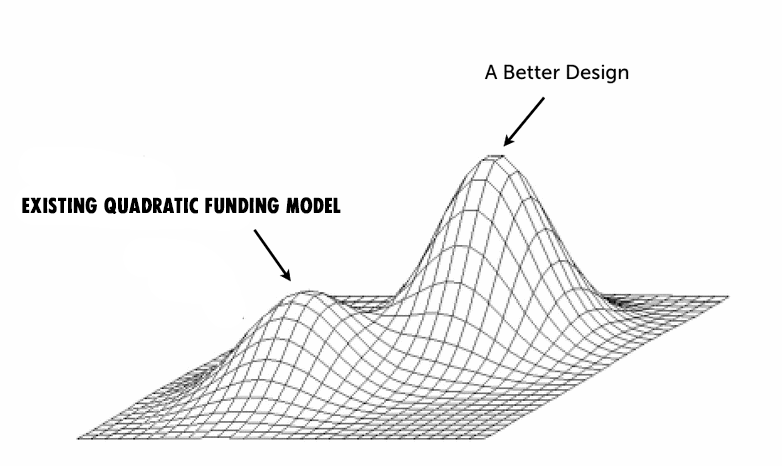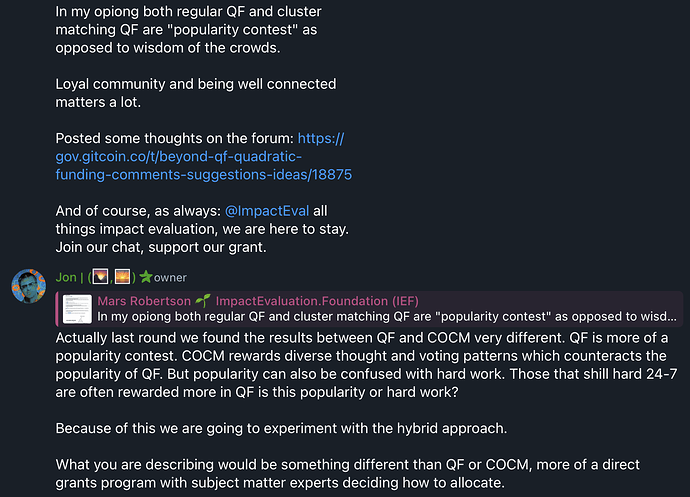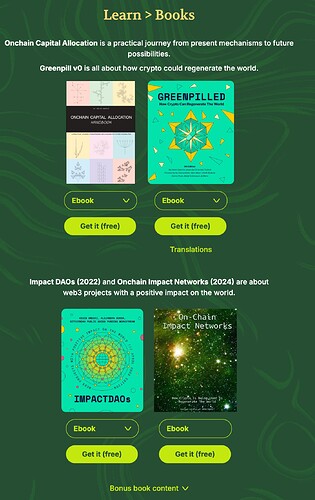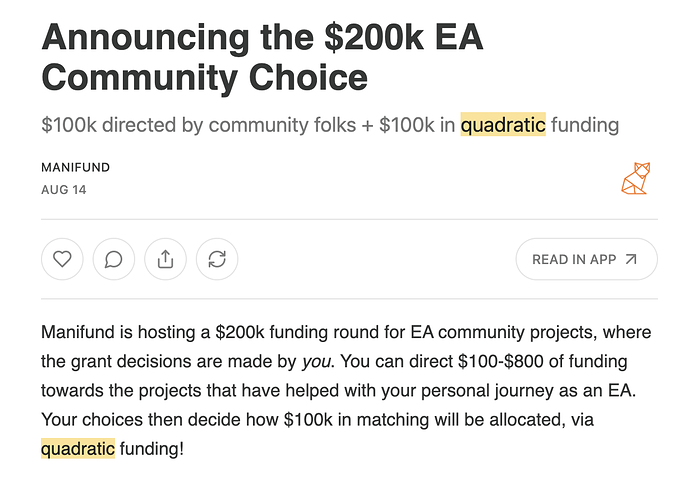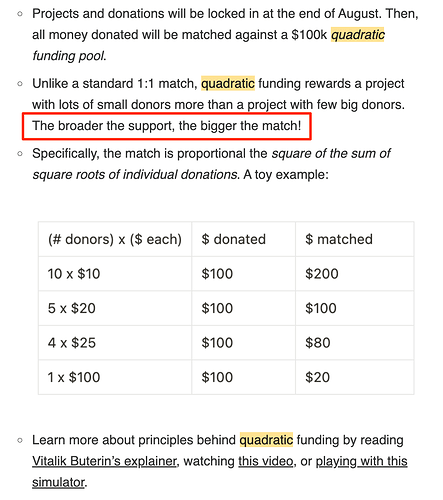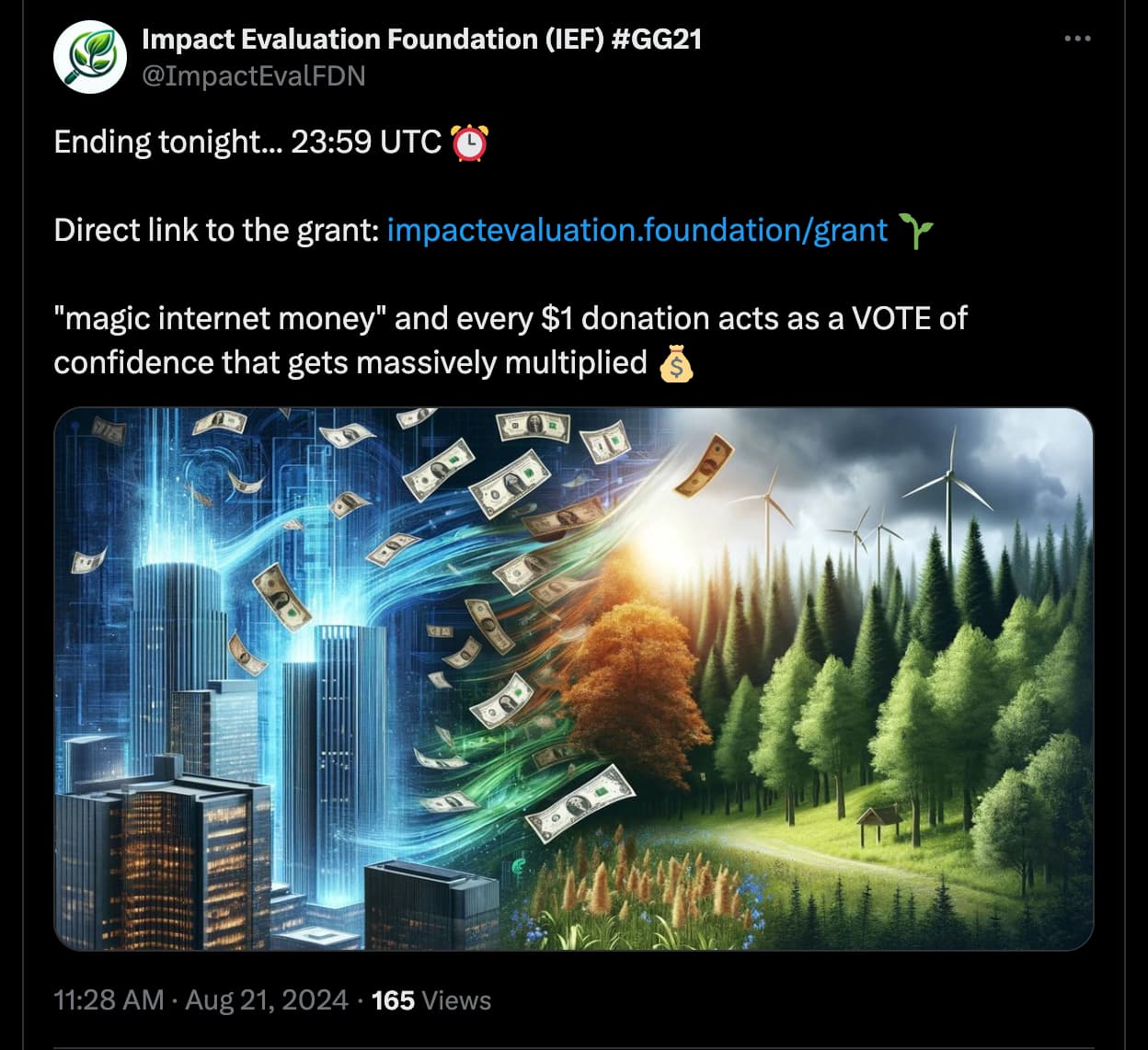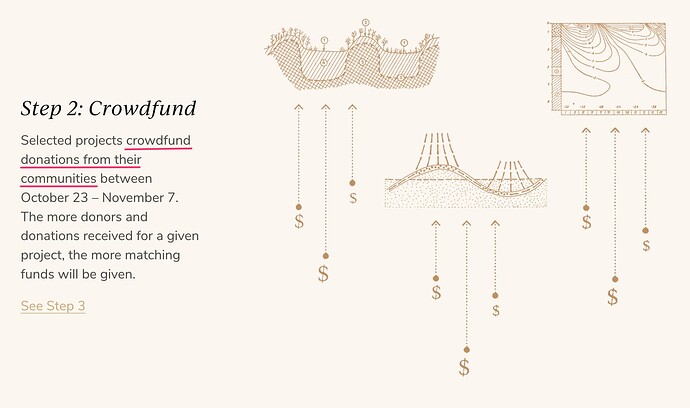Beyond QF
My personal view, exhibit ![]() :
:
It’s not the broader Web3 community vote. It’s a popularity / shilling contest. Who has the most loyal community that is already onboarded to Web3.
Shared this view while hosting LetsGROW Live and everyone currently on the space agreed, I saw a screen full of emoji reactions.
Exhibit ![]() : Ditch Quadratic Funding?
: Ditch Quadratic Funding?
Exhibit ![]() : someone talking about different voting: Telegram: Contact @climatecoordinationnetwork
: someone talking about different voting: Telegram: Contact @climatecoordinationnetwork
Just wondering what platforms out there enable conviction voting?
I think gitcoin only enables QF? They did some blog posts about conviction but I can’t see it anywhere in the final platform
Exhibit ![]() : harsh (controversial, provocative, could be engagement farming) tweet but delivers the point::
: harsh (controversial, provocative, could be engagement farming) tweet but delivers the point::
Quadratic Funding isn’t just a flawed popularity contest; it’s detrimental because it devolves into a self-congratulatory circlejerk.
Based on ![]()
![]()
![]()
![]() I think there is enough evidence to figure out something better.
I think there is enough evidence to figure out something better.
EDIT / UPDATE: Ma Earth | Observations from Ma Earth’s first quadratic funding round
Everyone is competing and coordinating in a way that promotes the round. The current social media landscape reinforces this. It can become fatiguing, and a common criticism is that people feel it becomes a “shill fest” and “popularity contest”.
That marketing can have real value though
Projects are effectively competing with others in the pool. The more funds that get raised in aggregate, the more these matching multiples will dimish over time; but that also means more capital is coming in, so it’s working.
(great read with a fresh perspective)
Winners decide
Based on my observation (loyal community, network, good shillketing execution) I assume that winners of the QF are reliable, trustworthy, with established trust and reputation. Because of that trustworthines and reputation I’m suggesting creating a new model of fund distribution: top 20% of the projects distribute 20% of the allocated funds:
- 5% to projects that are good.
- 5% to projects that are good AND received little
- 5% to frens
- 5% to anyone you want, including keep to yourself
It can be cumulative, so if there is project that is good, and received little, run by a fren, and in fact this is my free choice = all the 20% of the distribution can go to a single project.
(this is currently proof of concept, there is no formal definition of what “good” or “little” or “fren” means, using social contract and common sense)
Community signal
This is an experiment ran by me. Encouraging “vonations” ![]() (vote with your donation, but without jockeying for positions). A round without massive matching: Planetary Council: community signal
(vote with your donation, but without jockeying for positions). A round without massive matching: Planetary Council: community signal ![]()
Genuine community vote, genuine community signal to tell us which project we should dedicate our focus


There is no massive matching pool, shiling, jockeying for positions. Instread we encourage you to have a look at the projects and see if you can donate / contribute resources: time, energy, effort, money.
Public goods generic category / charitable
Dedicated post about it:
Kickstarter style fundraising / crowdfunding platform
From the rules:
I can totally imagine accepting payment cards and treating Gitcoin as fundraising / crowdfunding platform. Not just ![]() but also PayPal Venmo WeChat, any form of currency to onboard “normies”.
but also PayPal Venmo WeChat, any form of currency to onboard “normies”.
Dedicated thread: $10,000 Donated to Gitcoin Zuzalu Round with Credit Card Pilot Project Proposal
Kickback / receipt of donation in the form of tokens
I reached out on Twitter to the author of the above Zuzalu Credit Card Pilot Project:
I was also thinking about “receipt of donation” - for every $ donated you receive a token, first ticker than came to mind is $DON (shorthand for donation) And then: some businesses that want to cater to Web3 / ReFi / regen communities can openly say: 80% cash 20% discount by accepting $DON (and then rabbit holes of #TokenEngineering, locking, burning, staking, all that fancy stuff)
(also like Don Corleone, the mafia boss, regen mafia boss, sounds cool)
The cashback in $DON… That’s also kind of logical. Inspired by the UK regulation - when donating, cannot receive anything in exchange. Donation token = hacker mindset, finding loopholes, treating regulation as a guideline.
I think it has some merit.
I think it adds additional incentive
I can totally imagine some eco regen community that has $50 per day accommodation facility to charge $40 and the rest is in $DON.
Measuring impact
As long as it legal and profitable, as long as dead treet is worth more than living tree, the destruction will continue, need to change the incentives and measure the full cost.
A new initiative that was created during GG20: https://impactevaluation.foundation
We invite frens / supporters / collaborators. Open-source, collaborative, transparent, public good from the start.
Twitter: @ImpactEvalFDN
Telegram: @ImpactEval
Not optimising for social media metrics, allowing it to grow organically before making waves and spreading out. If you are reading this, you are one of the first people / dogs / bots to know.
Curation on the homepage
Opened the issue on Grants Stack Github:
Make it nice and appealing. If there is some cool round going on feature it on
explorer.gitcoin.coas well as the main homepagegitcoin.co.
WIN-WIN-WIN. Quality rounds with quality projects help Gitcoin establish good first impression. Someone visits the homepage and sees quality.
That is also related to use cases for GTC and auction for real-estate and being featured.
HINT: I would love for Planetary Council: community signal ![]() to be featured, more than happy to offer legal bribes aka “incentives”.
to be featured, more than happy to offer legal bribes aka “incentives”.
Going 100x from here
Shared this thought on Discord:
Gitcoin has easy potential to go 100x from here, I can totally imagine a prosperous country like Norway or Saudi Arabia gives us 1% of their sovereing fund budget to fund public goods.
Some entities have more money than they can spend, that triggers ponzinomics style valuations of unprofitable startups and insane P/E (price to earnings) ratio multiples. I believe that reliably measuring impact (see above Impact Evaluation Foundation), being able to put $ sign next to impact created - that will enable more funding towards public goods.
